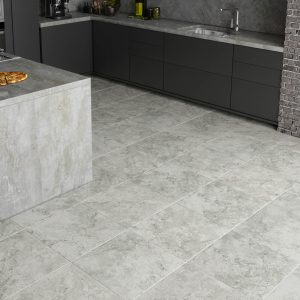What Kind of Natural Stone Flooring is Right for You?
When it’s time to upgrade your floors, it can seem as though the flooring options, along with their respective pros and cons, are endless. If you’ve narrowed your flooring choice down to elegant natural stone tiles, your final decision will be guided by many important considerations. Here’s a quick list of factors to consider.
Budget
While stone flooring is undeniably gorgeous, it should be noted that this beauty comes at a price. According to HomeAdvisor, it costs anywhere from $800 to $3,000 (not including the actual material needed) to install stone flooring. The stone itself typically costs between $5 to $10 per square foot, depending on type. Other factors also affect the installation cost. For example, creating an intricate pattern will take time and will therefore cost more. Designer tiles are more expensive, costing anywhere from $20 to $30 per square foot.
Porosity
Different types of stone have different porosities. This determines how much liquid they absorb and whether or not they’re suitable for more humid environments. Marble, for instance, is highly porous. Travertine, limestone, and slate are somewhat porous. Granite is considered waterproof. If you know your flooring is most likely going to be subjected to moisture and spills, it’s a better idea to select a neutral material that will not absorb liquid. You should also keep in mind that more absorbent types of stone may crack when subjected to freezing cold temperatures.
Porosity also affects a stone’s stain resistance. As more porous options, sandstone and marble are more susceptible to staining. Granite, on the other hand, is not likely to stain, which is why it is ideal for use in kitchens.
Use
When selecting natural stone flooring for outdoor use, it’s even more imperative to select options with the proper absorption rating (vitreous or higher) since drastic changes in temperature combined with a porous material will result in cracks. Additionally, natural stone materials often contain trace elements of iron which can oxidize or rust, staining the entire floor. Although it may seem like any type of stone will be fine in nature, you need to double-check that your choice can resist the elements to prevent damage!
When you are ready to explore natural stone flooring for your home, call our experts to help determine the perfect fit for your beautiful indoor spaces and dazzling outdoor areas as well.



